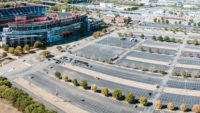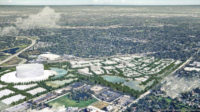Nashville could be the site of the latest major stadium-based construction program, under a proposal offered by the National Football League’s Tennessee Titans.
Intended to be built adjacent to Nissan Stadium, the Titans’ home since 1999, the 1.7-million-sq-ft enclosed facility would cost upward of $2.2 billion, according to team estimates.
Tennessee’s recently approved budget authorizes the state to issue $500 million in bonds for the project once an agreement has been reached with the Titans’ owners and the city of Nashville. Additional funding would come from the team and local sources.
A Titans representative says the team has not hired an architect for the proposed stadium and has released only a draft concept of the project. Estimating a 31-month construction phase after funding and designs are in place, the team says an aggressive approach could have the facility ready as early as the 2026 NFL season.
In addition, the team owners envision the new stadium as an anchor for a 4-million-sq-ft to 6-million-sq-ft campus of retail, office and residential buildings, which the team would build out over 10 to 15 years. The Titans are owned by the family of the late Bud Adams, the team’s founder, who moved the franchise from Houston to Nashville in 1997.
A major renovation to Nissan Stadium has been under consideration for the past few years. The team says the original concrete frame is inflexible to accommodate major updates, while all mechanical, electrical and plumbing systems are in need of upgrades. Inflation and further inspection of the building and its infrastructure have combined to push the original $500-million to $600-million estimate to more than $1 billion, the team says. The city of Nashville is responsible for stadium maintenance under the Titans’ 30-year stadium lease, which expires in 2029.
Construction of an entirely new, enclosed stadium would also continue the NFL’s recent trend toward multipurpose venues, including the $5.5-billion SoFi Stadium in Los Angeles and the $1.9-billion Allegiant Stadium in Los Angeles, both of which opened in 2020.
An enclosed facility could also improve Nashville’s ability to compete for other major sports events such as the Super Bowl, college football playoffs, World Cup soccer games and the NCAA’s men’s basketball Final Four.





